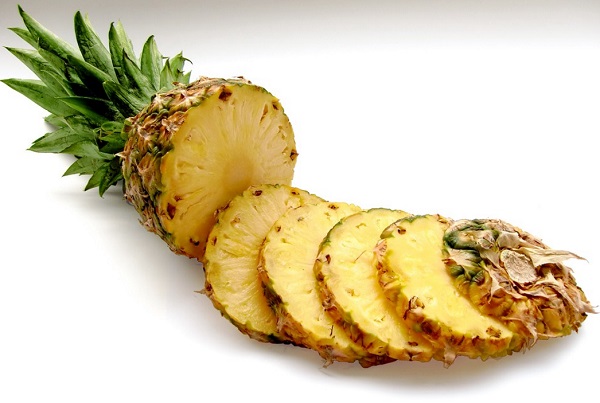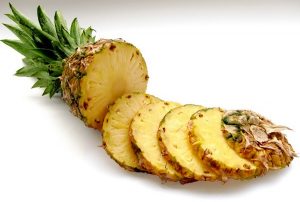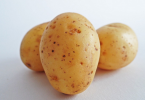So you are watching a movie with your feline friend on a Friday night. While enjoying a take out Hawaiian pizza, you reach for another slice and notice a distinctly pineapple shaped vacancy and your “date” licking its lips. You know that he most likely ate it but can cats eat pineapple? Should you be worried or if there is an excess of it should you give your furry buddy some more?
A tropical treat
Pineapples are part of the bromeliaceous family and are native to the Americans. Named pineapples due to their resemblance to the European pinecone in the 17th century, the Spanish brought them to Europe and then to Africa. They are now one of the most popular fruits in the world being used for juices, cocktails and popular pizza toppings.
Pineapples are enjoyed by most everyone, at least in small bites. The pineapple is quite sweet and may not be tolerated by some with sensitive taste buds. Overall, most people will like to have a bit of tropical fruit every now and again. Pineapple is quite versatile, thereby reaching an even larger audience of fruit eaters through the many uses of the fruit.
One may eat the fruit whole, after it has been skinned, or as a topping onto another food. The fruit can be mixed into yogurts and cereals, or blended into a smoothes. Pineapple can even be puréed and eaten in a way similar to applesauce or spread across bread like jam. How about cats? Can they enjoy it too?
Can cats eat pineapple?
Yes, occasionally and in moderation. A small piece of fresh pineapple is generally safe for a cat. However, canned pineapple should be avoided, as they are saturated in juices with high sugar content. When feeding fruits to your cat, you should always try to adhere to a ‘fresh is best’ mentality’. Canned and processed fruits are not as pure as their fresh counterparts.
Added ingredients, syrups, and preservatives can pose a danger to your cat and possibly cause a reaction.
Fresh fruit is considered a whole food, free from added ingredients and potential toxins. When a pineapple is skinned, the inside is soft and smooth, without seeds or shells that may cause a potential choking hazard. Pineapples are an easy to eat and easy to offer fruit to both humans and animals. While eating is easy and safe for most, fruits should only be eaten by cats on occasion.
As a cat food
Cats, being obligate carnivores, need to get the majority of their nutrients from proteins and, in particular, meat. But this does not mean that some grains, fruits and vegetable are not beneficial in providing a balanced diet. These were once obtained from the stomach contents of a cat’s kill but now are included in your cat’s kibble, which can be augmented if only for variety and pleasure as much anything else. This is the case with pineapple. Pineapple can be beneficial as it contains a significant amount of manganese and vitamin C.
Although, cats do produce their own Vitamin C, so offering pineapple to your cat to benefit from this vitamin is not truly necessary. However, a little extra Vitamin C does not do them any harm. Vitamin C will help your cat boost his/her immune system and stay healthy for a long time to come.
Pineapples are also a good source of copper, fiber, foliate, and Vitamin B6. These vitamins are the building blocks for a healthy cat and should be utilized within foods whenever available. When offering your cat a treat, you as the owner should have the bites derive from a fruit source such as the pineapple, given the robust amount of vitamins and minerals. Feeding your cat little prepackaged kitty treats are ‘ok’, but offering fruit is better for their health, their teeth, their weight, and their immune system. Just like humans, cats benefit from snacking on fruits rather than cookies and crackers.
The key when experimenting with new foods is to first check if they are inherently harmful (think onions and chocolate) and then give a small amount to see if your cats either like it or if it has any adverse affect on them. If you cat seems to enjoy the food offered, watch the kitty for any side effects or odd behavior. In the event your cat shows a side effect of distress, call your vat right away. If your cat behaves normally after eating pineapple, and does not have any stomach issues afterward, feel free to offer your kitty a pineapple bite every now and again.
Can cats eat canned pineapple or drink pineapple juice?
Tinned pineapple and pineapple juices should be avoided due to their sometimes unbelievably high sugar content and the additives and preservatives that go into them. Cats are not designed to deal with either, so they are best avoided in any foods.
Cats of any type from domesticated Mr. Tittles, to an Indian tiger, are not equipped to process plant matter, so less is definitely more. If your cat eats too much the result of this inability to process will be most visibly seen in frequent bouts of diarrhea, which is no fun for anyone involved. If you have given a new food recently and this happens, cut down or cut it out. It is not worth it.
Are pineapples toxic to cats?
Pineapples are not inherently toxic to cats but do be careful as they contain an enzyme called actinidian, which some cats can have an allergic reaction to. Actinidian is also found in kiwi so if they got an upset stomach after taking a slice of kiwi off a cheese cake, you made it is probably best to avoid pineapple altogether.
Pineapple tops and leaves
It is probably natural curiosity or boredom as much as anything else that may see your cat becomes intrigued by a whole pineapple. We know that cats will chew on anything green if they don’t get the chance to go outside and satisfy their desire to have a lick or a chew on some grass or a new leaf.
Let’s face it: a whole pineapple is quite an interesting thing in itself and can often be seen just looking nice in the corner of the kitchen or in the center of a fruit bowl for a couple of days before it gets used. (This may also be because they are not the simplest of fruits to dissect but that is another story).
There is no harm at all in letting your cat satisfy its curiosity or its natural want to scratch, claw and chew on the leaves. This is probably the only thing they are useful for as they are inedible and due to their very fibrous nature only just about compostable. However, pineapple leaves are pointy and sharp and most cats would probably leave them alone.
Conclusion
As cats do not have the ability to sense sweetness, the main danger with pineapple would come from the canned kind, so best to avoid that all together. The main health benefit will come in the form of a mild laxative. If your cat is constipated a chunk or two of pineapple is a tasty, healthy and interesting way to get your cat to ingest that little bit of extra roughage that should get things moving again.
So the next time when it is a movie night you might ask, “Can cats eat pineapple?” Yes they can. But it is probably best to let them have a few licks from your hand rather than stealing off your pizza and eating it alone in the corner, it is a lot more romantic too.
References:
http://www.catster.com/lifestyle/cat-health-can-cats-eat-exotic-fruit
http://www.catster.com/lifestyle/cat-health-are-pineapple-leaves-poisonous-toxic-cats









Leave a Comment